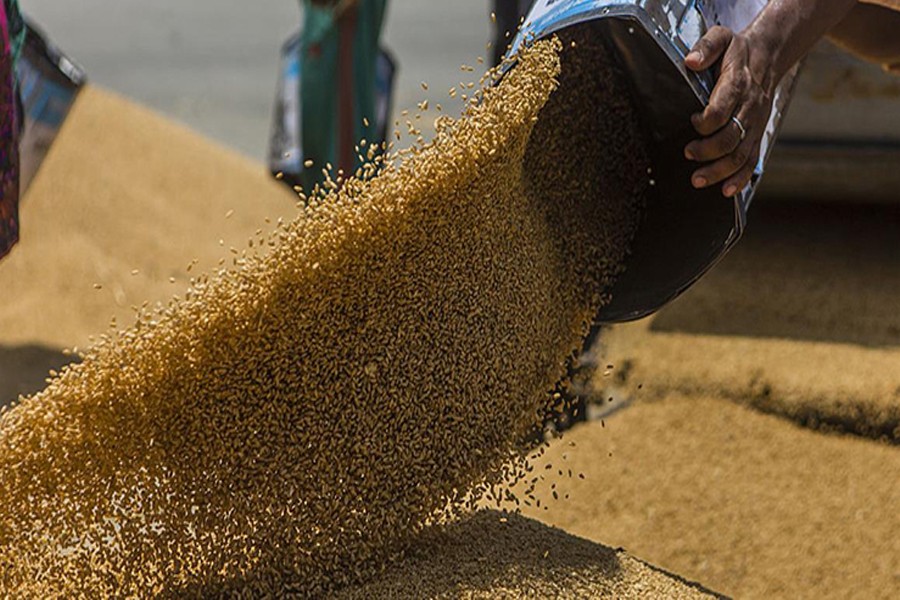Import of the second staple food, wheat, witnessed a drastic fall in the first quarter (July-September) of the current fiscal year, raising concern over the country's food security in coming months, insiders say.
Private importers have bought in less than 0.4 million tonnes during the period when prices of wheat flour hit an all-time high of Tk 55 (coarse) to Tk 75 (finer) a kg.
Considering imports in any of the first quarters since FY '11, wheat import in Q1 of FY '23 hits a 12-year low, according to the food ministry data.
In the last fiscal year, FY '22, a total of 4.0 million tonnes of wheat was imported, a seven-year low, amid global price surge in the third and fourth quarters, the data show.

Low imports and a minimal local output have contributed to a gradual surge in prices of wheat flour and all items made from flour in the last one year.
According to Trading Corporation of Bangladesh (TCB) and groceries, the prices of coarse flour or atta and finer flour or maida registered an increase of 8.0-10 per cent in a month and 52-60 per cent in a year.
The maximum retail price of maida reached Tk 75 a kg and atta hit Tk 65 a kg on October 8, up from Tk 46 and Tk 40 respectively a year ago.
Though prices of wheat declined in the grain-exporting countries over the last four months, sharp depreciation of taka against US dollar as well as surging freight charges have discouraged importers from bringing in wheat for the time being, said market insiders.
Moammad Abul Bashar Chowdhury, chairman of BSM Group, a leading commodity importer in the country, said volatility in US Dollar exchange rate was a major reason that discouraged many importers from bringing in wheat in large volume in the first quarter.
In addition, high freight charges were also a drag on the import, he added.
However, prices of wheat both in the Black Sea region and in the North America have declined recently to US$ 300 and US$ 390 a tonne respectively from $ 440- 490 a tonne in May this year.
"With freight and other charges included, European wheat now costs $ 380 to $390 a tonne while North American wheat $ 440-$445 a tonne," said Mr Chowdhury.
He also said the situation might improve as six to seven ships carrying some 0.5 million tonnes of wheat might start reaching the Chittagong Port this month.
"But overall wheat import in this FY might be much less than in the previous years as traders are bringing in the grain cautiously, considering the high dollar rate as well as a decline in demand," he added.
Head of the directorate general of food (DGoF) Md Shakhawat Hossain said the government has set a target to import 0.65 million tonnes of wheat, 50,000 tonnes of which have been bought from Bulgaria.
The government has also G2G deal with Russia for procurement of a 0.5 million tonnes, 50,000 tonnes of which will reach the port soon.
Economist and professorial fellow at the Bangladesh Institute of Development Studies (BIDS) Md Asaduzzaman said the shortage of wheat might put pressure further on rice, which should be taken into consideration from the perspective of food security.
He said the government should take an initiative so that importers could buy US dollar at Bangladesh Bank-fixed rate.
He also said the government has taken a good initiative to import 0.5 million tonnes of wheat from foreign sources.
The government should also raise the target of wheat imports to ensure a good stock in the public warehouses as prices might change at any time due to the ongoing war in Europe, he added.
He also said a policy should be taken to raise local production of wheat to minimum 3.0 million tonnes from the current 1.1 million tonnes to ensure a good local stock.
"Concerned consumers' rights organisations should also monitor the market so that leading companies and importers couldn't fleece the customers," he added.
Bangladesh has a demand for 7.0-7.5 million tonnes of wheat annually, but it produces only 1.1 million tonnes locally while the remaining demand is met through import, according to the agriculture and commerce ministries.


